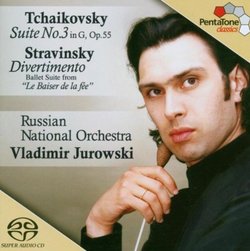| All Artists: RNO Title: Tchaikovsky: Suite No. 3/Stravinsky: Divertimento Members Wishing: 0 Total Copies: 0 Label: Pentatone Original Release Date: 1/1/2005 Re-Release Date: 1/17/2006 Album Type: Hybrid SACD - DSD Genre: Classical Style: Symphonies Number of Discs: 1 SwapaCD Credits: 1 UPC: 827949006166 |
Search - RNO :: Tchaikovsky: Suite No. 3/Stravinsky: Divertimento
 | RNO Tchaikovsky: Suite No. 3/Stravinsky: Divertimento Genre: Classical
|
Larger Image |
CD Details |
CD ReviewsA Conductor and Orchestra Creating Their Specific Language Grady Harp | Los Angeles, CA United States | 05/01/2006 (5 out of 5 stars) "The Russian National Orchestra is growing in stature as a major player in the international scene, in part perhaps due to the near constant presence of Vladimir Jurowski, the young impressive Principal Guest Conductor of this ensemble. He brings musical intelligence and a penchant for the big sound, a fine fit for Russian orchestras, as well as sense of control and arching drama gleaned in his tenure as the Music Director of the ever-challenging Glyndebourne Opera Company. This fine recording pairs two Russian composers in works less well known to the public, but works rather married in spirit. The stunningly performed, symphonically ordered Tchaikovsky 'Suite No. 3' is less well known than the other two suites, due in part to the ballets based on 1 and 2. But Suite No. 3 is a beauty, full of lush melody and dancing, near schizophrenic rapid sections that represents some of Tchaikovsky's finer ideas. Jurowski knows how to balance his ensemble to perfect effect: the strings are warm and he knows when to let the big moments soar without sounding overblown. Stravinsky's 'Divertimento' (his own transcription of excerpts from the ballet 'The Fairy's Kiss') may seem on the cover to be at odds as a single recording. But in reality Stravinsky based this ballet on the example of the popular Tchaikovsky ballets, an homage to a more elegant age, and the music has a kindred lyricism unique to this 'diverting' work from Stravinky's oeuvre. And Jurowski's intelligent programming pays off: the Divertimento is a pleasing contrast companion to the Suite and he emphasizes the parity of the two. This is a fine recording and suggests a conductor about whom we will be hearing much. And here is a chance to own two relatively unknown works by very well known composers on one CD! Recommended. Grady Harp, May 06" Two Russian Classics Classily Done J Scott Morrison | Middlebury VT, USA | 02/04/2006 (4 out of 5 stars) "Here are two Russian orchestral works that are slightly odd bedfellows. But if one remembers that Stravinsky's 'Baiser de la Fée' is based on Tchaikovsky piano music and songs, maybe they are more related than one originally thinks. Tchaikovsky's Suite No. 3, not all that commonly encountered in concerts, is one of four that the composer wrote and it is a symphony in all but name. It even has some similarities with Brahms's Fourth Symphony in that its final movement is the longest and most important and is a set of variations. The movements are arranged like many late Romantic symphonies: A slow movement, one a little faster, a scherzo, and a big finale. Tchaikovsky's wonted melancholy is present in the first two movements: I is called 'Élégie' and II is 'Valse mélancolique'. But the Scherzo breaks loose with some of Tchaikovsky's most exhilarating exuberance - and oh, those Russian winds plays their hearts out! - and then the Finale is a big set of twelve variations (on a theme that couldn't sound more Russian) that become more and more difficult to distinguish from each other as we go along (that is to say, the first six are clearly demarcated but the last six merge into each other). Vladimir Jurowski, a still-young rising star conductor, conducts as to the manor born, although there is some flaccidity in I, I feel. He's music director these past four years of the Glyndebourne Opera and just named Principal Guest Conductor of the present orchestra, the Russian National Orchestra, a newish orchestra of crack players that came into being just after the fall of the Wall and the only major Russian orchestra that is independent of the government. (Their concertmaster, Sergey Galaktionov, is superb in the extended solos in the Finale -- juicy, luscious, virtuosic playing.)
We get the 'Baiser de la Fée' suite here, not the full ballet. Stravinsky, always with an eye to gaining performances (and remuneration) fashioned the suite in 1934 from the ballet score and revised it in 1950. Having just reviewed the characterful recent Robert Craft/London Symphony reissue of the full ballet, I have to say that I much prefer the long version. But this performance is quite wonderful. Sound, in both regular CD and SACD, is excellent although perhaps not the nth degree of cutting edge sonics. This Russian orchestra manages a kind of verve that is generally only heard from Russian players. It is interesting to note that these Russian horn players have not adopted the Western sound heard these days in some Russian orchestras like that of the Kirov. Scott Morrison" |

 Track Listings (8) - Disc #1
Track Listings (8) - Disc #1